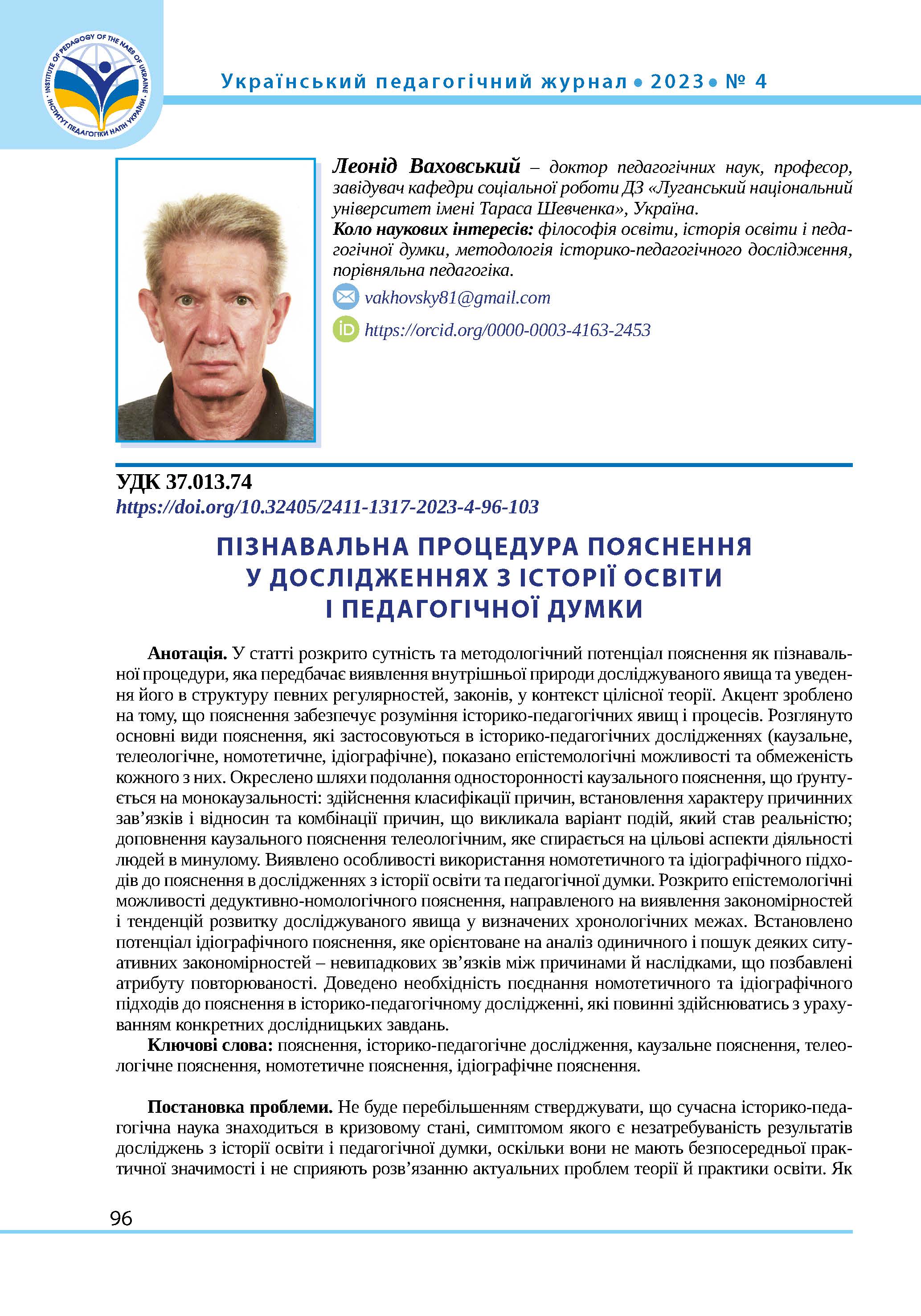Abstract
The article reveals the essence and methodological potential of explanation as a cognitive procedure, which involves revealing the inner nature of the phenomenon under study and including it in the structure of certain regularities, laws, in the context of a holistic theory. It is emphasized that the explanation provides an understanding of historical and pedagogical phenomena and processes. The main types of explanations used in historical-pedagogical research (causal, teleological, nomothetic, ideographic) are considered, and the epistemological possibilities and limitations of each of them are shown. The article outlines ways to overcome the one-sidedness of the causal explanation based on monocausality: classification of causes, establishment of the nature of causal relationships and the combination of causes resulted in the version of events that became a reality; supplementing the causal explanation with a teleological one, which is based on the target aspects of people's activities in the past. Features of the use of nomothetic and idiographic approaches to explanation in research on the history of education and pedagogical thought are identified. The epistemological possibilities of the deductive-nomological explanation, aimed at identifying patterns and trends in the development of the studied phenomenon within certain chronological limits, are revealed. The article establishes the potential of idiographic explanation, which is focused on the analysis of singular and the search for some situational regularities – non-random connections between causes and consequences, devoid of the attribute of repetition. The necessity of combining nomothetic and idiographic approaches to explanation in historical-pedagogical research, which should be carried out considering specific research tasks, is proved.
References
Бакаєв, М. Ю. (2021). Пояснення та розуміння як методи історичного і біографічного пізнання. Наукові записки НаУКМА. Філософія та релігієзнавство, 8, 3‒9. https://doi.org/10.18523/2617-1678.2021.8.3-9https://ekmair.ukma.edu.ua/handle/123456789/21685
Ваховський, Л. Ц. (2018). Методологічний потенціал інтерпретації в історико-педагогічному дослідженні. Освіта та педагогічна наука, 1 (168), 76‒84. http://pedagogicaljournal.luguniv.edu.ua/archive/2018/2018_No1(168).pdf
Гупан, Н. (2017). Iсторія педагогіки: питання кризи і розвитку. Український Педагогічний журнал, 1, 110–115. https://uej.undip.org.ua/index.php/journal/article/view/524
Ідіографічний метод (2007). Літературознавча енциклопедія : у 2 т. авт.-уклад. Ю. І. Ковалів. Київ : ВЦ «Академія», 1, 405. https://chtyvo.org.ua/authors/Kovaliv_Yurii/Literaturoznavcha_entsyklopediia_U_dvokh_tomakh_T_2/
Лещенко, М. П., Сулаєва, Н. В. (2013). Особистісно-орієнтовані дослідження педагогічної реальності: методологія, досвід, перспективи. Актуальні питання мистецької освіти та виховання, 2(2), 15‒41. http://nbuv.gov.ua/UJRN/apmov_2013_2_4
Савчук, І. Г. (2023). Номотетичний підхід. Словник суспільної географії. https://geohub.org.ua/node/4403
Ханстантинов, В. О. (2017). Філософія науки: курс лекцій. Миколаїв: МНАУ. https://dspace.mnau.edu.ua/jspui/bitstream/123456789/2176/1/Filosofiya_nauky_kurs_lektsiy.pdf
Albulescu, I. (2018). The Historical Method in Educational Research. American Journal of Humanities and Social Sciences Research, 2, 185‒190. https://www.ajhssr.com/wp-content/uploads/2018/08/W1828185190.pdf.
Bloch, M. (2015). The Historian’s Craft, Manchester University Press, Manchester. https://www.google.de/books/edition/The_Historian_s_Craft/YZdCcT_1Z8YC?hl=en&gbpv=1&printsec=frontcover.
Kinzel, K. (2020). Wilhelm Windelband. Stanford Encyclopedia of Philosophy. https://plato.stanford.edu/entries/wilhelm-windelband/
Kudláčová, B. (2016). History of Education and Historical-Educational Research in Slovakia through the Lens of European Context. Espacio, Tiempo y Educació, 3(1), 111-124. http://dx.doi.org/10.14516/ete.2016.003.001.7
Lowe, Roy. (2002). Do we still need history of education: is it central or peripheral? History of Education, 31, 6, 491‒504. https://www.tandfonline.com/doi/abs/10.1080/00467600210167055
Jardine, N. et al. (2000). The Scenes of Inquiry: On the Reality of Questions in the Sciences. Oxford Academic Books, 259–273. https://academic.oup.com/book/2540/chapter-abstract/142856082?redirectedFrom=fulltext&login=false
Raji, A. T. (2019). Explaining History. How History offers Explanations and establishes Causation. Munich, GRIN Verlag, https://www.grin.com/document/506968
Vakhovskyi, L. ., Ivchenko, T., & Sechka, S. (2022). A Casual Analysis in Research on History of Education. Journal of Education Culture and Society, 13(2), 253–262. https://doi.org/10.15503/jecs2022.2.253.262
Wright, G. H. (1971). Explanation and Understanding. Copyright. https://books.google.de/books?hl=en&lr=&id=33wCi2bg5x0C&oi=fnd&pg=PR7&dq=Wright,+G.+H.+(1971).+Explanation+and+Understanding.+Copyright.&ots=XWMRK075XV&sig=CDji2Pa2oEhLaRtRsgqtjOD27x0#v=onepage&q&f=false
Bakaiev, M. Yu. (2021). Poiasnennia ta rozuminnia yak metody istorychnoho i biohrafichnoho piznannia. Naukovi zapysky NaUKMA. Filosofiia ta relihiieznavstvo, 8, 3‒9. https://doi.org/10.18523/2617-1678.2021.8.3-9https://ekmair.ukma.edu.ua/handle/123456789/21685. (in Ukrainian).
Vakhovskyi, L. Ts. (2018). Metodolohichnyi potentsial interpretatsii v istoryko-pedahohichnomu doslidzhenni. Osvita ta pedahohichna nauka, 1 (168), 76‒84. http://pedagogicaljournal.luguniv.edu.ua/archive/2018/2018_No1(168).pdf. (in Ukrainian).
Hupan, N. (2017). Istoriia pedahohiky: pytannia kryzy i rozvytku. Ukrainskyi Pedahohichnyi zhurnal, 1, 110–115. https://uej.undip.org.ua/index.php/journal/article/view/524. (in Ukrainian).
Idiohrafichnyi metod (2007). Literaturoznavcha entsyklopediia : u 2 t. avt.-uklad. Yu. I. Kovaliv. Kyiv : VTs «Akademiia», 1, 405. https://chtyvo.org.ua/authors/Kovaliv_Yurii/Literaturoznavcha_entsyklopediia_U_dvokh_tomakh_T_2/. (in Ukrainian).
Leshchenko, M. P., Sulaieva, N. V. (2013). Osobystisno-oriientovani doslidzhennia pedahohichnoi realnosti: metodolohiia, dosvid, perspektyvy. Aktualni pytannia mystetskoi osvity ta vykhovannia, 2(2), 15‒41. http://nbuv.gov.ua/UJRN/apmov_2013_2_4. (in Ukrainian).
Savchuk, I. H. (2023). Nomotetychnyi pidkhid. Slovnyk suspilnoi heohrafii. https://geohub.org.ua/node/4403. (in Ukrainian).
Khanstantynov, V. O. (2017). Filosofiia nauky: kurs lektsii. Mykolaiv: MNAU. https://dspace.mnau.edu.ua/jspui/bitstream/123456789/2176/1/Filosofiya_nauky_kurs_lektsiy.pdf. (in Ukrainian).
Albulescu, I. (2018). The Historical Method in Educational Research. American Journal of Humanities and Social Sciences Research, 2, 185‒190. https://www.ajhssr.com/wp-content/uploads/2018/08/W1828185190.pdf. (in English).
Bloch, M. (2015). The Historian’s Craft, Manchester University Press, Manchester. https://www.google.de/books/edition/The_Historian_s_Craft/YZdCcT_1Z8YC?hl=en&gbpv=1&printsec=frontcover. (in English).
Kinzel, K. (2020). Wilhelm Windelband. Stanford Encyclopedia of Philosophy. https://plato.stanford.edu/entries/wilhelm-windelband/. (in English).
Kudláčová, B. (2016). History of Education and Historical-Educational Research in Slovakia through the Lens of European Context. Espacio, Tiempo y Educació, 3(1), 111‒124. http://dx.doi.org/10.14516/ete.2016.003.001.7 (in English).
Lowe, Roy. (2002). Do we still need history of education: is it central or peripheral? History of Education, 31, 6, 491‒504. https://www.tandfonline.com/doi/abs/10.1080/00467600210167055 (in English).
Jardine, N. et al. (2000). The Scenes of Inquiry: On the Reality of Questions in the Sciences. Oxford Academic Books, 259–273. https://academic.oup.com/book/2540/chapter-abstract/142856082?redirectedFrom=fulltext&login=false (in English).
Raji, A. T. (2019). Explaining History. How History offers Explanations and establishes Causation. Munich, GRIN Verlag, https://www.grin.com/document/506968 (in English).
Vakhovskyi, L. ., Ivchenko, T., & Sechka, S. (2022). A Casual Analysis in Research on History of Education. Journal of Education Culture and Society, 13(2), 253–262. https://doi.org/10.15503/jecs2022.2.253.262 (in English).
Wright, G. H. (1971). Explanation and Understanding. Copyright. https://books.google.de/books?hl=en&lr=&id=33wCi2bg5x0C&oi=fnd&pg=PR7&dq=Wright,+G.+H.+(1971).+Explanation+and+Understanding.+Copyright.&ots=XWMRK075XV&sig=CDji2Pa2oEhLaRtRsgqtjOD27x0#v=onepage&q&f=false (in English).

This work is licensed under a Creative Commons Attribution-NonCommercial-ShareAlike 4.0 International License.


